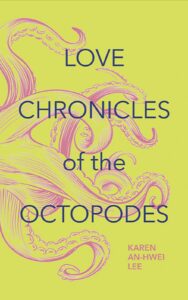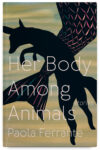
[Ellipsis Press; 2023]
Here’s everything you need to know about this novel’s protagonist: “Inwardly a woman, yet outwardly—phenotypically expressed, I mean—an octopus.” This woman, the only character in Karen An-Hwei Lee’s Love Chronicles of the Octopodes, is a clone of Emily Dickinson (Emily D., as this genetically distilled version of the long-dead, metaphysically inspired poet prefers to be called); the octopus is, well, an octopus. “An octopus, not a woman,” Emily D. insists. “Make no bones about it. In fact, I have no bones.”
A poet and scholar, Lee offers up her seventh book, her first work of fiction. Threading the needle of criticism and prose, Love Chronicles feels like a hybrid manifestation of these two parts of Lee’s brain, as she showcases an extensive knowledge of Emily Dickinson’s life and her own gift for lyrical flourishes.
Lee’s Emily D. is silly, arch, and meandering. Mimicking the elliptical nature of a Dickinson poem (“Ourself–behind ourself–Concealed–”), she reveals her considerable existential predicaments. Emily D. is a biogenetically engineered entity gone wrong, somehow flubbed in the petri dishes and tubes of the “stardust editors of the Genzopolis,” thrown out like yesterday’s trash into a black hole that smells of honey and rhododendrons. She wakes up alone in a lagoon on the other side of the universe (“the wrong side,” she is apt to say, like waking up on the wrong side of the bed and landing in a nightmare of exile and unceasing poetic fervor—“One need not be a chamber–to be haunted–”. . .).
Of course, the society that did the banishing is the future us: humans, Earthlings, citizens forsaking a God-like “maker” for our own science-obsessed wheelings and dealings. Giving herself over to the visions of her “octoeye” (a kind of psychic third eye), Emily D. reveals that the human race has, or soon will, destroy its own world, let climate change run amok, and resort to dystopian cannibalism. “My dear sea stars!” Emily D. might exclaim.
Over on the wrong side of the universe, Emily D. inhabits a haberdashery of charming, sundry items: a rolltop desk, a collection of olives, tins of anchovies, seashells, starfish, banana groves (never mind how these things got here; it’s hinted these too might have been chucked into a black hole [the same black hole?] like our narrator). But this physical world reveals the haunting prognostications of the mind. Emily D. experiences no demarcation between physicality and interiority. A moonbeam is a silent mailman lover. Her soft body is a pillow containing three hearts that ache for the histories of others. A sea of lost love letters are remnants of unwanted chromosome strands, “[b]ase pair letters of inheritance,” unrequited as flesh factory automatons chug out designer-gene citizens, purifying the gene pool back on the right side of the universe—yes, the one that invites apocalypse. “I know this history,” Emily D. says of the world from which she was exiled, “by the marginalia of moonlight upon my lagoon on this side of the universe: flood on the surf, fire on the turf—famine and flight by sea and by land.”
Written in the first-person singular, the playful yet earnest Love Chronicles of the Octopodes reminds me of Italo Calvino’s Cosmicomics, narrated by yearning old Qfwfq looking back on his life through the universe, first as a subatomic particle, then as a dinosaur, a human, and other critters along the way. Like Emily D., Qfwfq is mentally caught up in several dimensions of time and space as he relays the tales of his life, noting anachronous details and emotions within stories from billions of years ago. In one, he describes the early days of the moon orbiting Earth, when you could jump back and forth between the two. He becomes infatuated with the feminized Moon and chooses, one day, to stay behind in her milky crevices. Alas, Qfxfq says, “the fulfillment of my dream of love had lasted only that instant when we had been united.” This brief, lustful tryst, “spinning between Earth and Moon,” puts me in the mind of Claire-Louise Bennett’s divulging narrator in Pond, who also comingles with the inanimate, everyday elements of her self-imposed isolation. Listening to a storm while taking a bath, Bennett’s narrator washes her hair and becomes “immersed in the body of the storm; I knew its structure, saw its eyes, felt its past, and I empathised with its entreaty.” Yet, where Cosmicomics politely uses cosmology and earth science as a prop for fabulism and human pathos, and Pond convincingly merges physical space and subjective experience, Love Chronicles attempts both, and simply can’t hit either mark.
In Love Chronicles, science and isolation do not invite the reader into the oceanic waves of the human psyche. They appear, instead, as systems of distraction. Science factoids gum up the narrative. For example:
Obviously, the genes influencing an inherited compulsion for automatic thought repetition weren’t knocked out of me; like free radicals, roaming in our bodies at will, so do our compulsive negative thoughts, wreaking havoc on the psychological nuances of our inner lives, riding the hormonal tides of the body and the darkling imaginations of the subconscious alike. Free-radical scavengers like leafy kale, crudites, and dark-skinned berries don’t mitigate this negativity; only the free thought radicals and positivity advocates do. However, it does not hurt to add blueberries, blackberries, marionberries, radishes and carrots, and genetically modified, detoxifying chlorella boosted vitamins A, B complex, C, D, and K.
Detoxifying chlorella? Are we reading a Women’s Health article? Why would an octopus/human hybrid knocked out of a dystopian future Earth give a whit about contemporary food science and oxidative stress? If these facts about the counteracting effects of vitamins on the byproducts of stress are supposed to be humorous and fun, they are not; they are, instead, befuddling given the other contextual clues and premise of this story. Despite the novel’s futuristic setting and plot, Emily D.’s world and imagination (“autofictions,” as she likes to call them, sometimes “thought experiments”) typically do not move beyond what we would consider commonplace in our own world today, despite the vast movements of time and space that have happened to get Emily D. to where she is. Her inner contemplations include high sodium, hypertension, chapbooks, hydrotherapy, hyaluronic acid, gluten-free, nut-free, and dairy-free foods, and gratitude lists. I object! If we’re going to get weird, let’s get weird. It would be far funnier and more surprising if an octopus/woman hybrid was obsessed with maybe one of these contemporary distractions, but everything including the kitchen sink is here.
Lee presents us with a notion that strikes me as false: that an introverted, lonely mind will only contemplate all that is not her own. As if the original Emily Dickinson, abstract and transcendent in her poetry, moved only beyond her orbit, inhaled it all, from the microscopic to God’s throne. But Dickinson was chained to her everyday world, and heightened that world through language that made the familiar exhilarating. This book does the opposite; Lee strips the everyday away from her extraordinary character and gives her only the entire universe. This abundance, ironically, reveals the author’s restraint in imagination.
Emily D. is enjoyable when she locates a telling, truthful thought, when her author unites this character and her circumstances:
I wonder if my tingling octopus nerves, laden with gustatory and tactile sensitivity, constitutes a soul like this other Emily? Is my meek parcel of consciousness more than a summation of nerves? It’s like asking whether the fragrance of a cabbage rose is the soul or a spirit, or if the plums and the pudding comprise the whole smorgasbord of body, mind, and soul. In this world, my body is also a brain—or brains, nine total—and vice versa for my body, but what is a soul?
An octopus whose body pulses with emotion, changes colors as she dreams, lives via the brains in her arms, who is cursed (or blessed) with human consciousness: such a creature is right to wonder about the nature of a soul. Where does the mind stop, and the body begin? In this tale of fantastic sentience, it’s not the question that’s moot; it’s the answer.
Jennifer Lynn Christie is a writer and user experience developer living in Bloomington, IN. Her reviews have appeared at Entropy, Denver Quarterly, Newfound, and Full Stop. Her stories have appeared in Best of the Net, Heavy Feather Review, Always Crashing, and elsewhere.
This post may contain affiliate links.







